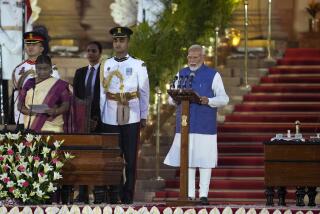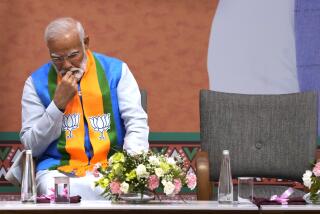The Politics of Change Grips India
NEW DELHI — As of now, predominantly Hindu India has a Muslim foreign minister, a ban on a TV commercial based on Marilyn Monroe’s famous billowing-skirt scene and an edict for female newscasters to wear saris that bare less.
All of this, and the Hindu nationalist government that willed it into being is expected to be gone with the wind next week.
Barring a miraculous shift in political arithmetic, the infant government of Prime Minister Atal Behari Vajpayee, who was sworn in last Thursday, will probably fall during its first test vote in Parliament, becoming the shortest-lived in India’s history.
“It’s a tragicomedy,” Rajni Kothari, a political scientist and social activist, said Wednesday. “Nothing now seems to be really workable.”
But the rituals of India’s British-inspired system grind on, regardless of the government’s presumably short lease on life.
On Friday, in the low, round building that houses India’s Parliament, President Shankar Dayal Sharma will read out Vajpayee’s agenda for governance, one that probably will never be applied.
Finance Minister Jaswant Singh is busy assuring foreign investors they are still welcome, and that contracts signed under the leadership of former Prime Minister P.V. Narasimha Rao will be honored.
The 12-member government’s sole Muslim, Sikandar Bakht, reportedly went into a sulk after being given the low-profile urban development and employment portfolio. On Tuesday, he was given the prestigious post of foreign affairs as well.
Bakht showed up at the External Affairs Ministry on Wednesday morning, “took charge” and left, an official said.
Home Minister Murli Manohar Joshi, a former president of the now-ruling Bharatiya Janata Party, said his priority will be to “fulfill the suppressed aspirations of millions of people.”
Though his party muted its anti-Muslim rhetoric during the election campaign, Joshi’s words were taken to mean carrying out the BJP’s platform pledge to build a temple to a Hindu god at a disputed site in the town of Ayodhya where a mosque once stood.
That could again trigger communal tensions, and possibly riots, across India.
Of all of India’s new rulers, Information and Broadcasting Minister Sushma Swaraj has been the most visible. In her first day on the job, she decreed that “patriotism and nationalism” are to be promoted in the electronic media and “cultural invasion” by the West halted.
“Present newscasters wear semi-transparent clothes,” she also complained. And Swaraj ordered Doordarshan state television to ax two commercials because their content was “objectionable.”
In a spot for the Videocon brand of televisions, a girl struggles to control her billowing skirt in a redux of a celebrated scene from “The Seven Year Itch.”
“It violates the norms of decency,” a senior ministry official told reporters. “This is not our culture.”
Vajpayee already has called himself an “interim prime minister.”
And though the BJP ordered its state units to stage rallies Saturday to mark “Honor the Mandate Day,” few doubt that the party’s brief spell in power is nearly done.
Parliament is so badly deadlocked, Kothari believes, that India may need two more elections in the next two years to force a political realignment.
More to Read
Sign up for Essential California
The most important California stories and recommendations in your inbox every morning.
You may occasionally receive promotional content from the Los Angeles Times.










